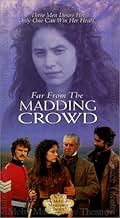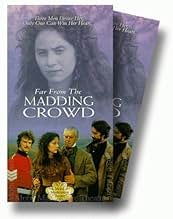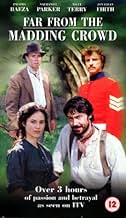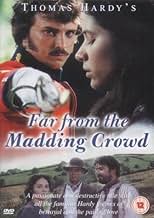Ajouter une intrigue dans votre langueA vain, pretty girl has recently taken over her uncle's farm. Her independent, naïve personality leaves her torn between the three men who wish to marry her.A vain, pretty girl has recently taken over her uncle's farm. Her independent, naïve personality leaves her torn between the three men who wish to marry her.A vain, pretty girl has recently taken over her uncle's farm. Her independent, naïve personality leaves her torn between the three men who wish to marry her.
- Victoire aux 1 BAFTA Award
- 2 victoires et 2 nominations au total
Avis à la une
10Lady X
Having read this book more than once (it is my favorite Thomas Hardy book, and one of my favorite books of all time), and having seen both filmed versions, I have to say that the original version (with Alan Bates, Julie Christie and Peter Finch) cannot hold a candle to the second (with Nathaniel Parker, Paloma Baeza and Nigel Terry).
The original version was a great disappointment to me -- Julie Christie was, as another reviewer pointed out, too old for the part of Bathsheba, did not fit Hardy's description of her at all, and has never impressed me as much of an actress -- a major casting faux pas, in my opinion. Peter Finch, as Boldwood, did not elicit the strong feeling of empathy from me, as Nigel Terry did in his portrayal of the character. The greatest surprise to me, in regard to the first version, was that I also felt the same about Alan Bates' performance as Gabriel Oak -- he did not convey the emotions and the quality of Oak's character, as described by Hardy in the book, and I found his portrayal to be bland, boring, and, at times, overacted. Part of the blame would have to be shared by the director of that version -- the actors appeared to be acting, and neither they, nor the director, seemed to have a firm grasp or understanding of the explicit emotions and personalities of the characters, which Hardy had gone to great effort and detail to describe in the book.
After having seen Nathaniel Parker's interpretation of Gabriel Oak, I cannot imagine anyone else playing the part -- it was the first time I had seen Mr. Parker in any performance, and he ripped my heart out with his portrayal of this noble, dignified, aggrieved and tormented soul. He and Ms. Baeza, Mr. Terry, and Mr. Firth (Sergeant Troy), seemed to have a thorough comprehension of, and sensitivity toward, the characters as they were intended by Thomas Hardy -- they appeared to have walked straight out of the pages of the book! In addition, the sensitive and intuitive direction by Nicholas Renton drew powerful performances from all, including a superior supporting cast. The accurate period costumes, and beautiful sets and cinematography, serve to round out a production of true quality.
I highly recommend to anyone interested in this story, that he or she consider reading the book first. Although this screenplay remains true to the book, some of the detail which enhances understanding and feeling for the characters, the time period, and the plot, was edited due to time constraints, as is common with filmed productions of great pieces of literature.
The original version was a great disappointment to me -- Julie Christie was, as another reviewer pointed out, too old for the part of Bathsheba, did not fit Hardy's description of her at all, and has never impressed me as much of an actress -- a major casting faux pas, in my opinion. Peter Finch, as Boldwood, did not elicit the strong feeling of empathy from me, as Nigel Terry did in his portrayal of the character. The greatest surprise to me, in regard to the first version, was that I also felt the same about Alan Bates' performance as Gabriel Oak -- he did not convey the emotions and the quality of Oak's character, as described by Hardy in the book, and I found his portrayal to be bland, boring, and, at times, overacted. Part of the blame would have to be shared by the director of that version -- the actors appeared to be acting, and neither they, nor the director, seemed to have a firm grasp or understanding of the explicit emotions and personalities of the characters, which Hardy had gone to great effort and detail to describe in the book.
After having seen Nathaniel Parker's interpretation of Gabriel Oak, I cannot imagine anyone else playing the part -- it was the first time I had seen Mr. Parker in any performance, and he ripped my heart out with his portrayal of this noble, dignified, aggrieved and tormented soul. He and Ms. Baeza, Mr. Terry, and Mr. Firth (Sergeant Troy), seemed to have a thorough comprehension of, and sensitivity toward, the characters as they were intended by Thomas Hardy -- they appeared to have walked straight out of the pages of the book! In addition, the sensitive and intuitive direction by Nicholas Renton drew powerful performances from all, including a superior supporting cast. The accurate period costumes, and beautiful sets and cinematography, serve to round out a production of true quality.
I highly recommend to anyone interested in this story, that he or she consider reading the book first. Although this screenplay remains true to the book, some of the detail which enhances understanding and feeling for the characters, the time period, and the plot, was edited due to time constraints, as is common with filmed productions of great pieces of literature.
I am a big fan of movies that follow the novel, and this version does not disappoint. It helps if one truly loves literature, as I do, but even so this story is incredible. The film makers did a wonderful job with this. It makes me want to move back to England when I watch it.
This is a wonderful adaption of the great Thomas Hardy novel. Though the 1960's version (starring Julie Christie, Alan Bates,and Terrance Stamp) is gorgeous, this film is not so dated and the performances are in keeping with the original intent of the novelist. All the principles are strong but especially impressive is Nigel Terry's performance as doomed Mr. Boldwood whose love for Bathsheba drives him from hope and new-found happiness to despair and frenzy.
The locations are beautiful - almost another character in the story. The dialects of the locals may be difficult to understand at first but my ear learned to listen. The video version allows for playback of difficult to understand dialog.
Definately worth the 4 hour investment. It made me re-read the novel and enjoy it all over again.
The locations are beautiful - almost another character in the story. The dialects of the locals may be difficult to understand at first but my ear learned to listen. The video version allows for playback of difficult to understand dialog.
Definately worth the 4 hour investment. It made me re-read the novel and enjoy it all over again.
This is a beautifully realized adaptation. Producers took a risk in using the rural dialect, and it works. That's just another touch that makes the story and the characters more real than the Hollywood version. Baeza is a treat, and Parker has never been better. Writing, directing and performance wring out every heartbreaking and humorous emotion of the Hardy novel. My one quibble is that often the rural scenery seemed "too" green for the harvest time of year, but that's a wee mark.
I just finished writing my review for the 2015 version. I saw both versions within 2 weeks of each other for the first time and only 2 months after reading the book for the first time (absolutely loved it!!!).
Of the two movie versions I've seen, this is by far and away the more accurate of the two. Not surprising that Masterpiece Theater would trump Hollywood in that field, especially considering the runtime is twice as long. Granted that the 2015 version is much prettier to look at, I just think a digitally remastered Blu-ray release is what this version really needs. And new cover art! Rarely have I found such awful-looking cover art concealing such a good movie.
The actress for Bathsheba in this movie is way more age-appropriate (she's supposed to be about 18) for this part than Carey Mulligan (who just turned 30) in the new one. Her playfulness and flightiness make more sense at her young age. Paloma Baeza seems less confident as an actress than she is in "The Way We Live Now" (love her in that movie), but since the character Bathsheba is often conflicted about what she should do, it works for the role.
Oak and Troy were well-cast, I thought. The actor for Oak surprised me as a choice at first (I knew him best from the 1998 "Vanity Fair"), but then he seemed to fit quite well. And this Troy did a much better job than the one in the 2015 version, in my opinion.
I really did not like the actor for Boldwood at all at first (sorry, but he seems a bit creepy and his mouth always looks upside-down to me), but I'm watching this through a second time and he's bothering me much less than he did the first time, as I'm getting more used to him. He's still a bit too old for the part. Hardy describes him (I thought at the time I read it that it was a very clever description) thus: "Apparently he had some time ago reached that entrance to middle age at which a man's aspect naturally ceases to alter for the term of a dozen years or so.... Thirty-five and fifty were his limits of variation--he might have been either, or anywhere between the two." Nigel Terry was 53 at the time he made this, but easily looks 60 or older.
Just as a warning, there are a few brief scenes that are not appropriate for children. I tend to make the mistake sometimes in thinking that all PBS movies will be at PG standards (I wish they would), but that is not always the case. It is not extremely explicit (perhaps I will add a parental advisory note for this), but definitely gets to PG-13 content a few times.
Overall this is a very good and mostly faithful rendition of a great book. I'd venture to say that about 90% of this version is portrayed close (maybe shortened or adjusted for the screen, but generally true to the original characters' actions/intents) to what was in the book. And with almost 4 hours of viewing time, they are able to cover most of the story quite thoroughly, including spending some time showing the many minor characters as distinct individuals (which is something that the 2015 version has no time to do, to its loss, as much of the book is spent in the conversations of the farm hands).
I plan to watch this frequently, and if they do make a Blu-ray release, I plan to upgrade as soon as possible!
Of the two movie versions I've seen, this is by far and away the more accurate of the two. Not surprising that Masterpiece Theater would trump Hollywood in that field, especially considering the runtime is twice as long. Granted that the 2015 version is much prettier to look at, I just think a digitally remastered Blu-ray release is what this version really needs. And new cover art! Rarely have I found such awful-looking cover art concealing such a good movie.
The actress for Bathsheba in this movie is way more age-appropriate (she's supposed to be about 18) for this part than Carey Mulligan (who just turned 30) in the new one. Her playfulness and flightiness make more sense at her young age. Paloma Baeza seems less confident as an actress than she is in "The Way We Live Now" (love her in that movie), but since the character Bathsheba is often conflicted about what she should do, it works for the role.
Oak and Troy were well-cast, I thought. The actor for Oak surprised me as a choice at first (I knew him best from the 1998 "Vanity Fair"), but then he seemed to fit quite well. And this Troy did a much better job than the one in the 2015 version, in my opinion.
I really did not like the actor for Boldwood at all at first (sorry, but he seems a bit creepy and his mouth always looks upside-down to me), but I'm watching this through a second time and he's bothering me much less than he did the first time, as I'm getting more used to him. He's still a bit too old for the part. Hardy describes him (I thought at the time I read it that it was a very clever description) thus: "Apparently he had some time ago reached that entrance to middle age at which a man's aspect naturally ceases to alter for the term of a dozen years or so.... Thirty-five and fifty were his limits of variation--he might have been either, or anywhere between the two." Nigel Terry was 53 at the time he made this, but easily looks 60 or older.
Just as a warning, there are a few brief scenes that are not appropriate for children. I tend to make the mistake sometimes in thinking that all PBS movies will be at PG standards (I wish they would), but that is not always the case. It is not extremely explicit (perhaps I will add a parental advisory note for this), but definitely gets to PG-13 content a few times.
Overall this is a very good and mostly faithful rendition of a great book. I'd venture to say that about 90% of this version is portrayed close (maybe shortened or adjusted for the screen, but generally true to the original characters' actions/intents) to what was in the book. And with almost 4 hours of viewing time, they are able to cover most of the story quite thoroughly, including spending some time showing the many minor characters as distinct individuals (which is something that the 2015 version has no time to do, to its loss, as much of the book is spent in the conversations of the farm hands).
I plan to watch this frequently, and if they do make a Blu-ray release, I plan to upgrade as soon as possible!
Le saviez-vous
- AnecdotesFeatured playing period music is the Mellstock Band, which also appeared in Tess of the D'Urbervilles (1998).
- ConnexionsVersion of Far from the Madding Crowd (1909)
- Bandes originalesGee-Ho! Dobbin!
Performed by Paloma Baeza
Meilleurs choix
Connectez-vous pour évaluer et suivre la liste de favoris afin de recevoir des recommandations personnalisées
Détails
Contribuer à cette page
Suggérer une modification ou ajouter du contenu manquant

Lacune principale
By what name was Far from the Madding Crowd (1998) officially released in Canada in English?
Répondre





























